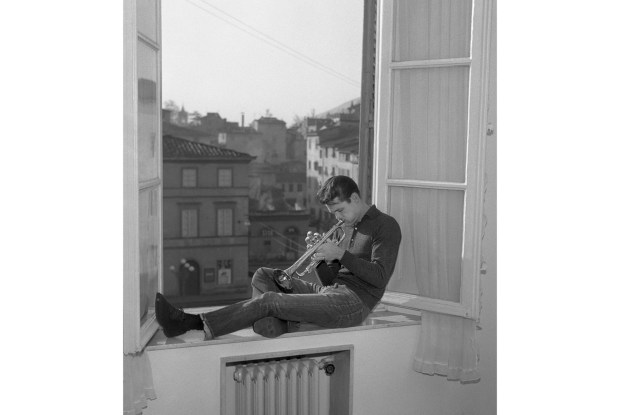Albums of the year? What a good question. Some years we can answer it, some years we can’t. The essence of pop music is its newness, its absolute determination to upgrade itself and keep on upgrading itself, often beyond anyone’s interest in its upgrading itself. Accordingly, there are some years when the paid-up music obsessive has to retrench and consolidate and — quite simply — stop buying new records until he can find somewhere to put them.
I only bought about 25 new CDs this year, of which only five or so were new-new-new. As yet, none of them has really come through. But there’s time. There’s tomorrow, there’s next week, and there’s the rest of my life to get the most out of the David Bowie album. And there’s not even that for the Daft Punk album, which I thought was very thin. My copy has already progressed to the next phase of its existence, under the letter ‘D’ in Oxfam Books & Music, with all the other Daft Punk albums people were underwhelmed by. As only the middle-aged now buy CDs, it’s clearly punters of a certain vintage who were fooled by the hype and the deep, Nile Rodgers-inspired catchiness of ‘Get Lucky’. Daft Punk got lucky. I’m not sure we did.
In a year of musical retrenchment, though, it doesn’t really matter what else is going on. Most of the records you listen to are the ones you already had. I wrote here a couple of months ago about suddenly ‘getting’ Talk Talk’s Spirit Of Eden, which had been sitting on my shelves virtually unplayed for a quarter of a century. That would probably be my album of 2013, and there are a couple of others that have also made the breakthrough. It goes without saying that all these albums are slow-burners, but so many pop albums burn brightly and go out, and I know which I’d prefer to keep me warm on a cold winter’s night.
Kate Bush’s Director’s Cut (2011) was a little overshadowed by the same year’s 50 Words For Snow, partly because the latter was a brand-new album and the former only a rejigging of old tracks. Both albums continue her progression towards quieter, jazzier textures and more opaque melodies — the tall blonde woman who also lives here shakes her head and says she doesn’t get Kate Bush any more — but Director’s Cut is marginally more accessible and has stronger songs. Indeed, to my ears, every one of these versions comprehensively trumps the originals on The Sensual World and The Red Shoes. This is music to surrender to, get lost in. And I love the fact that someone who acknowledges no commercial imperatives, who follows her own artistic whims, still manages to sell heaps of records.
I have bought a few albums by the US singer-songwriter Aimee Mann over the years and nearly liked them, but never quite enough. Were the songs too samey? Was her voice a little too dreary? Similar questions could probably be asked of @#%&*! Smilers (2008), but for some reason, this time it all works. She writes pop songs in the old-fashioned way, with guitars, hooks and a perennially raised eyebrow. This record is enriched by a slightly broader musical palette than usual, but it’s the quality of the writing that makes the difference. ‘Freeway’ is the radio hit, strong and straightforward. ‘31 Today’ has the McCartneyesque hook you’re amazed you have never heard before. And songs like ‘Phoenix’ and ‘Columbus Avenue’ suddenly make glorious sense after 10, 15, even 20 hearings. Has she maintained the same standards on subsequent recordings? I haven’t yet dared find out.
Finally, one that really does go back a few years. Natalie Merchant was once the singer and main songwriter for 10,000 Maniacs, a classic nearly-group of the late 1980s who should have been but weren’t quite. Again, I kept nibbling tentatively at the solo career without really enjoying the flavour, until this year when I bought Motherland (2001), mainly because I loved Christy Moore’s version of the title track. It’s a quite stunning record, the full three-course meal of melody, folk-rock with a soulful edge, and shorn of Merchant’s occasional tendency to tweeness and obscurity for its own sake. T-Bone Burnett co-produced and obviously made the difference, which is probably why she hasn’t worked with him since. ‘Put The Law On You’ is the nearest she will ever get to the blues, and ‘Motherland’ itself is one of those songs you are amazed the world hasn’t heard and taken to its heart. It’s the world’s loss, as always.
Got something to add? Join the discussion and comment below.
Get 10 issues for just $10
Subscribe to The Spectator Australia today for the next 10 magazine issues, plus full online access, for just $10.
You might disagree with half of it, but you’ll enjoy reading all of it. Try your first month for free, then just $2 a week for the remainder of your first year.













Comments
Don't miss out
Join the conversation with other Spectator Australia readers. Subscribe to leave a comment.
SUBSCRIBEAlready a subscriber? Log in